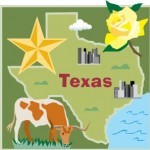By taking an innovative approach to its pigging operations Pioneer Natural Resources earned for itself a 2014 Texas Environmental Excellence Award (TEEA). Using a three-tiered approach, Pioneer was able to reduce its operational emissions by 90 percent. For its efforts, Pioneer was recognized with other winners’ projects at a banquet held on the last night of the TCEQ Environmental Trade Fair and Conference in Austin, TX. BTW, I wasn’t able to make the TCEQ conference even though I had already registered and paid. I highly recommend attendance at the conference in 2015 for anyone who does business in Texas.
So what did Pioneer do? Well, you can read a short summary below, but much more information about the project and a short video summary is available here: http://teea.org/winners/2014/pollution-prevention/pioneer-natural-resources
First, Pioneer installed larger barrels for pig launching and receiving. These larger barrels held more pigs – natch! – resulting in less venting of natural gas to the atmosphere when valves are opened to add or remove them.
Secondly, the pressure in the barrels was reduced from 100 pounds of pressure to 1 pound prior to opening. The result: Less venting of natural gas to the atmosphere.
And finally, Pioneer installed suction drain lines to route accumulated natural gas liquids back into production. This differs from standard industry practice which is to drain the liquids into open-air tubs that evaporate into the air. Yikes! Really? That’s “standard industry practice”?
What is pigging?
Pigging is a standard industry process involving running a spherical ball, called a pig, through a pipeline to sweep out accumulated produced liquids and debris. Loading and retrieving pigs into and from a pipeline often requires opening several hatches and valves that allow small amounts of natural gas to vent into the atmosphere.
Interested in snagging a TEEA for your company in 2015? The 2015 Application Cycle will open August 2014. Visit the TEEA site to apply. http://teea.org/texas-environmental-excellence-awards
I’ve been conducting Training Seminars and Onsite training in Texas for several years now on the topics of Hazardous Material transportation and Waste Management. And though they are more strict and more broad than those of the USEPA and most other states (California being the exception) the regulations of the TCEQ for the management of hazardous waste, Used Oil, Universal Waste, and Non-Hazardous Industrial Solid Waste can be understood. It just takes good training.


